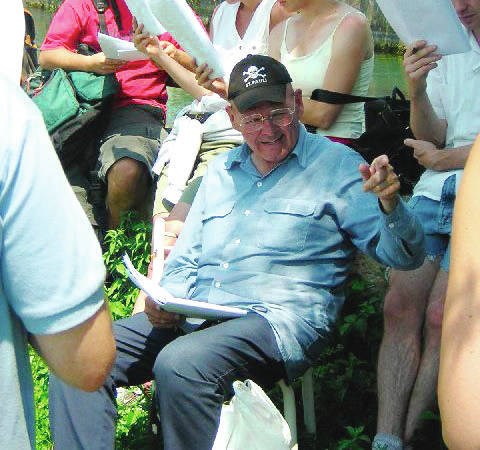The death of Father Reginald Foster from COVID-19 at age 81 is a milestone of a kind for those interested in Romance-based languages.
Father Foster, a Roman Catholic priest who was considered the foremost Latinist in Rome and, quite possibly, the world, was also the Vatican’s expert when it came to that ancient not-dead-yet language.
News of his death took me back to a Sunday in late 1964 when I had been touring with a musical group in rural New South Wales.
We had played a show in Orange, a small agricultural town 270 kilometres or so from Sydney, and were billeted with families around the town, which was evenly divided between Catholics and Anglicans.
The show had been on a Saturday night. On the Sunday morning, my billet, a Catholic family, asked if I would like to attend mass with them.
The elderly priest sounded as if he had just stepped off the boat from Ireland. At the point in the mass when it was time to deliver his sermon, he turned to the congregation and, after a pause, said in his thick brogue: “Well, da holy fathers in Rome have decreed dat as from next Sundy we’ll be sayin’ da mass in English — God help ‘am all.”
Then he turned and finished the mass in Latin, obviously dismayed that his church was discontinuing use of Latin in the mystical liturgy he had cherished all his life.
The decision to ditch Latin made sense to me at the time, after suffering through five years of high school Latin. Only one of my teachers ever managed to excite an all-boys class of surfers and rugby players about the language.
That teacher, a priest, loved Cicero. The Roman statesman, who died in 43 BC, was a prosecutorial lawyer, scholar and politician whose extensive writings include treatises on rhetoric, philosophy and politics.
Our preceptor, as he preferred to be called, enjoyed acting out Cicero’s orations, especially when the great orator thundered at the accused — that “iste,” that wretch, that guilty thing.
In recent years, I’ve come to be more appreciative of the impact that even my brief unwilling relationship with Latin had, not only on my study of English but on my ability to learn, at the most basic level, brief smatterings of other Romance languages — Spanish for trips to Mexico and French because, well, I live in Canada.
The grammatical structures and much of the vocabulary of those languages can be traced back to Latin, so having even a tenuous grip on that ancient language was a considerable help.
Knowledge of Latin is also important to those studying medicine, nursing and the law. Many medical terms and almost all legal terms are Latin words.
Beyond that, anyone who has studied even a couple of semesters of Latin will be able to enjoy Gregorian chants sung by groups such as the Tallis Scholars, or, as we did during a recent trip to Quebec, the spine-tingling Latin hymns of the monks at Saint-Benoit-du-lac, the Benedictine Abbey on the shores of Lac Memphremagog.
Does the death of Father Foster mean the end of the Latin liturgy? Is it a death knell for the language itself?
Apparently not, for some traditionalists.
A 2011 Vatican document instructs bishops around the world to reintroduce the old Latin mass abandoned in the late 1960s if traditionalist Catholics in their areas request it.
And some have.
A recent report by Una Voce, an international pro-Latin group, said most growth in use of the restored Latin liturgy was in the United States, Britain and France, as well as developing Latin-American countries, where a growing majority of Catholics live.
In many other countries, including my homeland of Australia, Latin is not offered in the mainstream curriculum, but is still available in many public and private high schools as an elective subject in the academic stream.
So Father Reginald Foster’s legacy lives on — and not just in the Vatican.
As Virgil, author of the Aeneid, did not but might have written: “semper bona idea non est omnino amissa” — no good idea is ever completely lost. Or words to that effect.
Geoff Johnson is a former superintendent of schools and is appreciative (from the Latin “appretiare,” to value) of the assistance of Google Translate in writing this piece.



